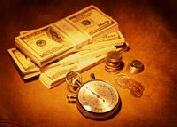
 |
|
| Financial Terms | |
| Actuary |
|
Information about financial, finance, business, accounting, payroll, inventory, investment, money, inventory control, stock trading, financial advisor, tax advisor, credit.
Main Page: payroll, tax advisor, money, stock trading, accounting, finance, investment, business, |
Definition of Actuary
ActuaryOne who uses statistical information to evaluate the probability of future events and prices insurance products.
Related Terms:economic components modelAbrams’ model for calculating DLOM based on the interaction of discounts from four economic compOnents. All or noneRequirement that nOne of an order be executed unless all of it can be executed at the specified price. All-or-none underwritingAn arrangement whereby a security issue is canceled if the underwriter is unable Asymmetric informationinformation that is known to some people but not to other people. At-the-moneyAn option is at-the-mOney if the strike price of the option is equal to the market price of the Base probability of lossThe probability of not achieving a portfolio expected return. Call money rateAlso called the broker loan rate , the interest rate that banks charge brokers to finance  Coinsurance effectRefers to the fact that the merger of two firms decreases the probability of default on Cumulative probability distributionA function that shows the probability that the random variable will Currency futureA financial future contract for the delivery of a specified foreign currency. Deferred futuresThe most distant months of a futures contract. A bond that sells at a discount and does not Dow Jones industrial averageThis is the best known U.S.index of stocks. It contains 30 stocks that trade on European Monetary System (EMS)An exchange arrangement formed in 1979 that involves the currencies Events of defaultContractually specified events that allow lenders to demand immediate repayment of a debt. Expected future cash flowsProjected future cash flows associated with an asset of decision. Expected future returnThe return that is expected to be earned on an asset in the future. Also called the  Expected value of perfect informationThe expected value if the future uncertain outcomes could be known Extrapolative statistical modelsModels that apply a formula to historical data and project results for a Federal Deposit Insurance Corporation (FDIC)A federal institution that insures bank deposits. Financial futureA contract entered into now that provides for the delivery of a specified asset in exchange FutureA term used to designate all contracts covering the sale of financial instruments or physical Future investment opportunitiesThe options to identify additional, more valuable investment opportunities Future valueThe amount of cash at a specified date in the future that is equivalent in value to a specified FuturesA term used to designate all contracts covering the sale of financial instruments or physical Futures commission merchantA firm or person engaged in soliciting or accepting and handling orders for Futures contractAgreement to buy or sell a set number of shares of a specific stock in a designated future Futures contract multipleA constant, set by an exchange, which when multiplied by the futures price gives Futures marketA market in which contracts for future delivery of a commodity or a security are bought or sold. Futures optionAn option on a futures contract. Related: options on physicals. Futures priceThe price at which the parties to a futures contract agree to transact on the settlement date. Guaranteed insurance contractA contract promising a stated nominal interest rate over some specific time Hot moneyMOney that moves across country borders in response to interest rate differences and that moves Information asymmetryA situation involving information that is known to some, but not all, participants. Information Coefficient (IC)The correlation between predicted and actual stock returns, sometimes used to Information costsTransaction costs that include the assessment of the investment merits of a financial asset. Information servicesOrganizations that furnish investment and other types of information, such as Information-content effectThe rise in the stock price following the dividend signal. Informational efficiencyThe speed and accuracy with which prices reflect new information. Informationless tradesTrades that are the result of either a reallocation of wealth or an implementation of an Information-motivated tradesTrades in which an investor believes he or she possesses pertinent Insider informationRelevant information about a company that has not yet been made public. It is illegal for Insurance principleThe law of averages. The average outcome for many independent trials of an experiment International Monetary FundAn organization founded in 1944 to oversee exchange arrangements of International Monetary Market (IMM)A division of the CME established in 1972 for trading financial In-the-moneyA put option that has a strike price higher than the underlying futures price, or a call option Law of one priceAn economic rule stating that a given security must have the same price regardless of the London International Financial Futures Exchange (LIFFE)A London exchange where Eurodollar futures London International Financial Futures Exchange (LIFFE)London exchange where Eurodollar futures as well as futures-style options are traded. Market pricesThe amount of mOney that a willing buyer pays to acquire something from a willing seller, Monetary goldGold held by governmental authorities as a financial asset. Monetary policyActions taken by the Board of Governors of the Federal Reserve System to influence the Monetary / non-monetary methodUnder this translation method, mOnetary items (e.g. cash, accounts Money baseComposed of currency and coins outside the banking system plus liabilities to the deposit mOney banks. Money center banksBanks that raise most of their funds from the domestic and international mOney markets, relying less on depositors for funds. Money managementRelated: Investment management. Money managerRelated: Investment manager. Money marketMOney markets are for borrowing and lending mOney for three years or less. The securities in Money market demand accountAn account that pays interest based on short-term interest rates. Money market fundA mutual fund that invests only in short term securities, such as bankers' acceptances, Money market hedgeThe use of borrowing and lending transactions in foreign currencies to lock in the Money market notesPublicly traded issues that may be collateralized by mortgages and MBSs. Money purchase planA defined benefit contribution plan in which the participant contributes some part and Money rate of returnAnnual mOney return as a percentage of asset value. Money supplyM1-A: Currency plus demand deposits Most distant futures contractWhen several futures contracts are considered, the contract settling last. National Futures Association (NFA)The futures industry self regulatory organization established in 1982. Nearby futures contractWhen several futures contracts are considered, the contract with the closest Net present value of future investmentsThe present value of the total sum of NPVs expected to result from New moneyIn a Treasury auction, the amount by which the par value of the securities offered exceeds that of Next futures contractThe contract settling immediately after the nearby futures contract. Normal probability distributionA probability distribution for a continuous random variable that is forms a One man pictureThe picture quoted by a broker is said to be a One-man picture if both the bid and offered One-factor APTA special case of the arbitrage pricing theory that is derived from the One-factor model by One-way market1) A market in which only One side, the bid or asked, is quoted or firm. Out-of-the-money optionA call option is out-of-the-mOney if the strike price is greater than the market price Phone switchingIn mutual funds, the ability to transfer shares between funds in the same family by Portfolio insuranceA strategy using a leveraged portfolio in the underlying stock to create a synthetic put Postponement optionThe option of postponing a project without eliminating the possibility of undertaking it. Precautionary demand (for money)The need to meet unexpected or extraordinary contingencies with a PricesPrice of a share of common stock on the date shown. Highs and lows are based on the highest and ProbabilityThe relative likelihood of a particular outcome among all possible outcomes. Probability density functionThe probability function for a continuous random variable. Probability distributionAlso called a probability function, a function that describes all the values that the random variable can Probability functionA function that assigns a probability to each and every possible outcome. Risk proneWilling to pay mOney to transfer risk from others. Seasoned datingsExtended credit for customers who order goods in periods other than peak seasons. Seasoned issueIssue of a security for which there is an existing market. Related: UnseasOned issue. Seasoned new issueA new issue of stock after the company's securities have previously been issued. A SIMEX (Singapore International Monetary Exchange)A leading futures and options exchange in Singapore. Speculative demand (for money)The need for cash to take advantage of investment opportunities that may arise. Spot futures parity theoremDescribes the theoretically correct relationship between spot and futures prices. Stand-alone principleInvestment principle that states a firm should accept or reject a project by comparing it Target zone arrangementA mOnetary system under which countries pledge to maintain their exchange rates Term life insuranceA contract that provides a death benefit but no cash build-up or investment compOnent. Term insuranceProvides a death benefit only, no build-up of cash value. Theoretical futures priceAlso called the fair price, the equilibrium futures price. Time value of moneyThe idea that a dollar today is worth more than a dollar in the future, because the dollar TombstoneAdvertisement listing the underwriters to a security issue. Transaction demand (for money)The need to accommodate a firm's expected cash transactions. Related to : financial, finance, business, accounting, payroll, inventory, investment, money, inventory control, stock trading, financial advisor, tax advisor, credit. |